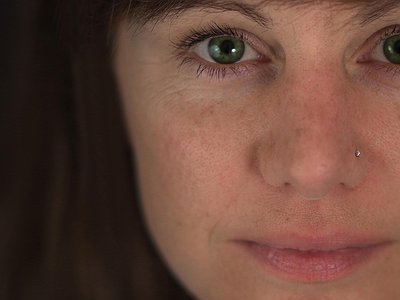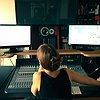Name: Aleah Morrison-Basu
Nationality: British
Occupation: Pianist /Composer
Website: www.aleahmorrison.com
Musical Recommendations: Model 86, his ear for fresh sounding production and his rhythmic intuition is insane / Shama Rahman has a PhD in the ‘Neuroscience of Musical Creativity using Complexity tools’, she explores the links between art and science. Her ability to fuze jazz improvisation with indian vocal and sitar melodies is insightful. Her latest project is fusing this with mi.mu gloves.
When did you start composing - and what or who were your early passions and influences?
I started composing at the age of 9. My pet guinea pig had just died so I channelled all my sadness into composing a song. It was obviously very naive and super simple but my piano teacher must have seen some merit in it and set me the task of composing a piece to a flower fairy poem. From that moment on I started composing songs. This later developed into composing for ensembles and orchestras, then electro-acoustic music and now music for visuals mostly. I was always interested in lots of different styles of music but my favourite pieces to play were usually from the romantic and impressionist era. A plethora of popular music styles, classical music, contemporary music, Greek and Arabic music have all influenced my music from a young age.
For most artists, originality is first preceded by a phase of learning and, often, emulating others. What was this like for you? How would you describe your own development as an artist and the transition towards your own voice?
I have never had an intention to create something original so I’m not consciously aware of the transition towards my own voice. I recognise that I’m constantly developing, mostly in specific areas where I’m making an effort to improve because I recognise they are my weaknesses. I’ll listen to a piece I composed last year and be happy not for the piece but because I can hear that I’ve improved since then. I think when I first started composing songs, I just sat at the piano and played around until I came up with a melody. It was very much an intuitive way of composing back then. Now I consider so many different factors depending on the project. I may start by listening to pieces I like and trying to emulate a similar feel before developing it into my own style. Or alternatively, a melody will just come into my mind and I’ll need to notate it before forgetting it and then I get lost in composing the piece from that one melody.
What were some of the most important creative challenges when starting out as a composer and how have they changed over time?
The most creative challenge was probably learning to be constructively critical of my work. Taking a step back and hearing the weaknesses and strengths of a piece. Over time I felt more comfortable with this and realised the next hurdle was admitting to myself when a piece was actually finished. Even now, I find that starting a piece and finishing a piece can be the most daunting creative challenge. The other biggest challenge for me is producing a piece that sonically sounds professional.
Tell us about your studio/work space, please. What were criteria when setting it up and how does this environment influence the creative process? How important, relatively speaking, are factors like mood, ergonomics, haptics and technology for you?
It’s really important to me to have a studio space that is inviting and peaceful. If there is tension I won’t be able to do my best work. The mood of a studio has a big influence on my creativity. I much prefer to have natural light but it’s not always possible in a sound-proofed studio.
Instruments are more important to me than an array of different technologies. It’s a modest set up with an acoustic guitar, electric guitar, electric piano, cello, sitar, clarinet, 2 harmoniums, a charango, a cahon, an electro-acoustic mbira, a nord lead 4 synth and then different software programs. I’ve also dabbled with Kyma in the past. A short film score I wrote predominantly used that.
Could you take me through the process of composing on the basis of one of your pieces that's particularly dear to you, please? What do you start with when working on a new piece, for example, how do you form your creative decisions and how do you refine them?
I don’t have a set process partly because of the diverse range of projects I work on. I use different approaches for each of them. When a client gives me a brief there will sometimes be audio references. If this happens I’ll make notes on what I perceive to be the key characteristics of the pieces then compose a few ideas based on these characteristics. If I have chosen the audio references it will be undoubtedly be pieces that I’m in awe of. I really enjoy analysing the ingenuity of pieces so in this scenario I’ll study the techniques that are used and then experiment with these. It’s akin to a research project with a thesis at the end. If I’m creating a score for TV or film I will use an intuitive approach coupled with an analytical approach. Sometimes the director will have a vision for the music so I will be inspired by these. I may play along to the scene a couple of times and record this. Then I’ll edit and develop these ideas on the computer.
If it’s a personal project like the piano album, I start by recording myself playing around on the piano. When I think I have an idea I’ll stop recording and edit the ideas into a structure. From there I will experiment with the harmonic rhythm and the piece will constantly evolve from that point. For the pieces I’m working on at the moment I’m currently exploring a less intuitive, more pragmatic approach which is actually taking me back to scoring by hand. Intuition plays a large role in the refining stages of my work. I have a gut feeling when something isn’t quite right so I’ll work on it relentlessly until my gut says yes.
What, if anything, do you personally draw from the cosmos of electronic music and digital production tools that is inspiring for your daily practise? In how far do you see the potential for a mutual creative pollination between the two?
Being from a classical background I have to admit it’s taken years for me to feel like digital production tools are another creative tool. There are some insanely talented producers out there who blow me away with their creative use of electronic music. My business partner is particularly good at this and I’m constantly listening in awe at what he creates. For me, the best thing about music production tools is that I have a bank of sounds all in one place. I can get software for almost any instrument I like, some are questionable in their realism but others are pretty accurate. Having this many instruments to work with can be my inspiration when another idea isn’t coming to mind.
How do you see the relationship between timbre and composition?
I see composition as a general term for describing a piece of art whether that be music/ painting etc. A composition is a collation of ideas that form a piece. Timbre is one of many elements that makes a composition.
Time is a variable only seldom discussed within the context of contemporary composition. Can you tell me a bit about your perspective on time in relation to a composition and what role it plays in your work?
In my current projects time is dictated by how long the client wants a piece to be. With my piano album I had the luxury of not having this restriction.



